April Jones: Largest police search for missing April
- Published
How the community helped search for April Jones
They were the words that triggered the biggest search in UK policing history.
"I think my daughter has been kidnapped."
In between sobs of despair, April Jones's desperate mother, Coral, rang 999 to report her daughter missing. Within a few hours, her whereabouts were the subject of hurried news conferences and social media frenzy.
Five-year-old April went missing from near her home on the Bryn-y-Gog estate in Machynlleth while playing with a friend at about 19:00 on a drizzly 1 October last year.
Insp Gareth Thomas on where the police searched for April
Within half an hour, April's older brother, who had been sent out to fetch her, told his mother "in a hysterical state" that a friend had seen April getting into a car with a man and "had gone".
A frantic Coral Jones and her friend Valerie Jones, who had been visiting the family at the time, immediately rang 999, kick-starting what was to become the biggest search for a missing person in UK police history.
Detectives were immediately sent to the family home and within hours the national Child Rescue Alert (CRA) system was triggered for the first time by the Child Exploitation and Online Protection unit, (Ceop), external.
A national 0300 hotline number was issued and the CRA linked all UK police forces to feed information into the incident room.
In the first 24 hours, the number of calls taken reached 1,270.
Meanwhile, word of April's disappearance had spread quickly among the close-knit community of Machynlleth - population just 2,100 - and on social media.
Hundreds of local people gathered to comb fields and farmland through the night for the youngster.
Posters of April were rapidly circulated and put up around the town and a picture of the five-year-old in the purple coat she was wearing when she disappeared was made public by her family.
As day broke, volunteers from as far afield as Manchester and Bristol had joined the efforts to search for the missing girl.
Later that day, local man Mark Bridger, 47, was arrested over her abduction.
Over the next few days Bro Dyfi leisure centre became the hub of the village with local shops providing food and equipment for the volunteer searchers.
Police set up roadblocks around the town while volunteers and specialist teams searched a 30-mile radius around the town, including rivers and the nearby coast.
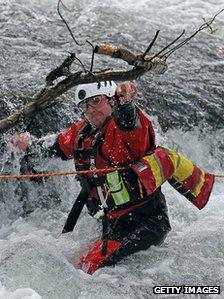
Even for the experts, the search for April was treacherous from the start
Bus companies ferried teams of searchers around the area and rubbish collections were halted in Machynlleth, with the workforce instead joining the search effort.
Coral Jones asked people to wear pink, April's favourite colour, leading to pink ribbons being worn and displayed around the town.
Hope remained that April would be brought home safe and well.
Meanwhile, the news of her disappearance was spreading not just nationally but globally.
A constant stream of news conferences, including an emotional appearance by her mother, were televised on rolling news channels, while the #FindApril hashtag on Twitter became a top-trending search term.
Prime Minister David Cameron also made a televised appeal for anyone with information to "help this family find their lovely child", adding that it was every family's nightmare.
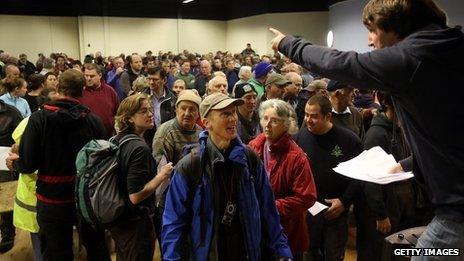
Up to 500 volunteers would regularly congregate at Bro Ddyfi leisure centre
However, police, "overwhelmed" by the response from volunteer searchers, soon became concerned for their safety in the wet, boggy countryside and pleaded with the public to leave the hunt to trained teams.
Five days after April was last seen, Bridger was charged with her murder.
Police were now convinced they were looking for April's body and a slow, meticulous search was well under way.
Over the next weeks and months, more than 650 areas around Machynlleth covering 60 sq km were scoured.
Mountains, gorges, streams and waterfalls were subjected to detailed examinations.
Teams of police marine units searched waterways while experts in searching confined spaces and mines were used to investigate the numerous abandoned mine shafts in the area.
Assistance was drafted in from fire and rescue urban search and rescue teams, the coastguard and mountain rescue teams, as well as specialist dog teams from around the UK.
Help from 45 police forces and the armed forces boosted the efforts.
On average 16 search teams were involved - a total of 150 officers taking part in the hunt every day - as well as 10 police dogs, 100 mountain rescuers, two RNLI vessels, kayakers and helicopter support.
They visited 700 homes during house-to-house inquiries, viewed 2,000 hours of CCTV footage, dealt with 4,744 calls and messages from the public and took 1,018 written statements.
In December, as it was revealed that the cost of the investigation was expected to top £2m, the Home Office said it would give a special grant to help the hunt continue.
Daily searches carried on with the exception of breaks due to inclement weather and Christmas and Easter.
During the search Supt Ian John, a senior investigator in the search, explained: "It has been a slow, forensic and methodical search where officers start work at around 8am and continue until 4-5pm, depending on conditions and when the sun has set."
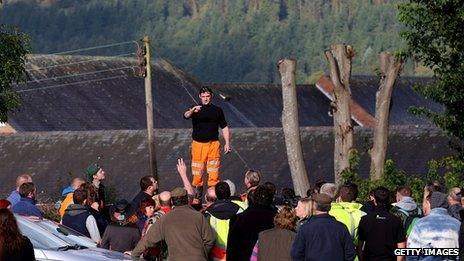
Buses ferried teams of volunteers to scour some 60 sq km
As they faced Christmas without their youngest child, April's parents, Coral and Paul Jones, thanked everyone who had helped in the search or sent them messages but said the pain was getting no easier to bear.
"We realise that this is a big news story, but to us it is our life."
By March, police announced efforts were being scaled back. After seven long months the search was called off.
It ended on 19 April, 28 weeks and four days after it began.
All leads were exhausted and no trace of April had been found.
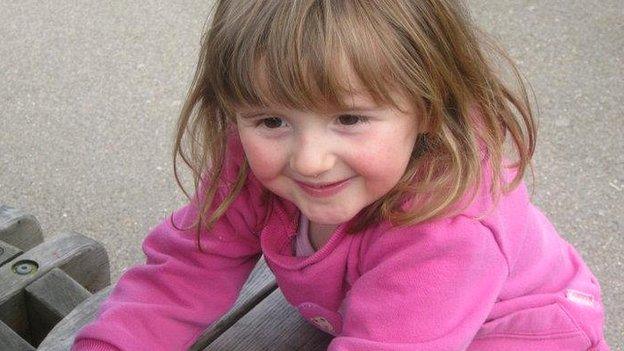
April Jones was the youngest child of Paul and Coral Jones, of Machynlleth, Powys

The five-year-old had a mild form of cerebral palsy and took ibuprofen and paracetamol to manage her pain
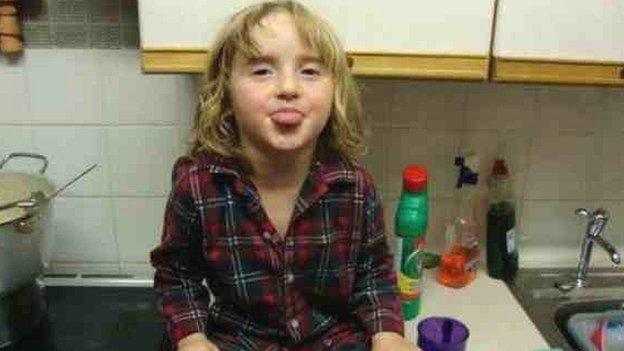
She was last seen on 1 October last year "happy and smiling", getting into Mark Bridger's Land Rover
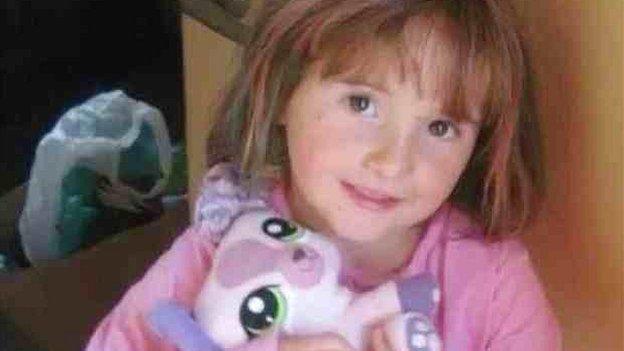
Coral Jones said April was "aware of strangers" and knew not to go off with anybody she did not know.